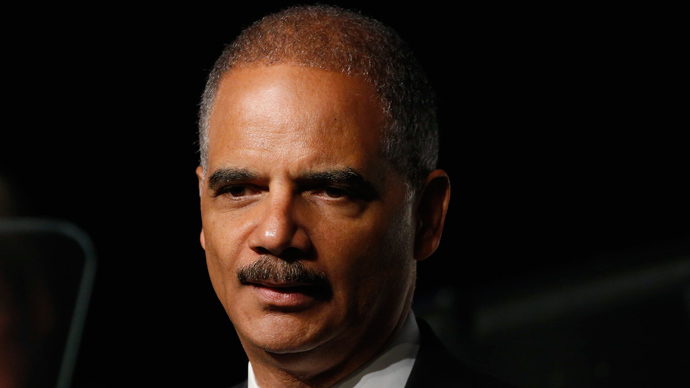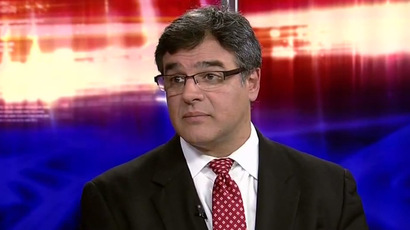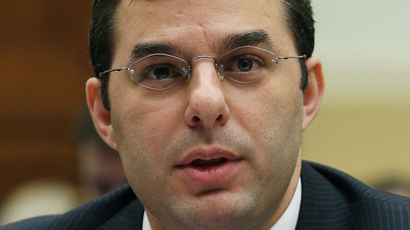Obama administration asserts NYT reporter must testify against source

The US Department of Justice has reasserted its view that New York Times reporter James Risen cannot claim First Amendment privilege in refusing to testify in a leak case allegedly stemming from a former CIA officer.
The DOJ’s decision to stand by its earlier calls for Risen’s
testimony will have certain ramifications for the future of
government whistleblowers and the open exercise of the right of a
free press.
Former CIA officer Jeffrey Sterling faces charges of violating
the Espionage Act for divulging supposedly sensitive national
security information. In Sterling’s case, the charges come from
the disclosure of a secret program “intended to impede Iran’s
efforts to acquire or develop nuclear weapons” published in
Risen’s 2006 book “State of War: The Secret History of the CIA
and the Bush Administration.”
The Obama administration has pursued eight Espionage Act cases,
more than all other presidential administrations combined since
the law’s inception in 1917. Besides Sterling, Bradley Manning
and Edward Snowden are among those charged with the arcane law.
The government’s attempts to compel testimony from Risen began
during the Bush administration. More recently, a federal appeals
court ruled in July that Risen did not have a reporter’s
privilege to refuse testimony, which overruled a previous ruling
by a district court that Risen did have that right.
Risen then both directly appealed to the DOJ to meet with him
(the letter went unanswered) and petitioned for the appeals court
to rehear his claims of First Amendment privilege. The DOJ’s
latest statement denied the rehearing.
The busy summer for Risen coincided with major stories involving
the DOJ and the rights of reporters. In May, it was revealed the
DOJ had seized several Associated Press phone records. In
addition, Fox News reporter James Rosen was labeled an “aider,
abettor and co-conspirator” in another leak investigation
involving a source facing the Espionage Act.
These events prompted new guidelines issued by the department on
how it would handle news outlets in similar cases. The guidelines
posited that compelling reporter testimony against a source would
be an “extraordinary measure,” and “a last resort,
after all reasonable alternative investigative steps have been
taken, and when the information sought is essential to a
successful investigation or prosecution.”
Risen seized on these new guidelines in his direct letter to the
DOJ in July. The letter stated, “The DOJ’s recent decision to
strengthen its already-strict, voluntarily guidelines for
subpoenaing members of the media provides further evidence of the
near unanimous consensus that journalists should have a qualified
privilege not to reveal their confidential sources and further
support a finding of a common law privilege.”
The DOJ countered arguing the new guidelines do not change the
circumstances of Risen’s case:
“Risen asserts that the Justice Department’s recent revisions
to its internal guidelines concerning investigations involving
members of the press support a common law privilege…. That is
incorrect. Although the Department has made significant changes
to parts of its internal guidelines — in particular, to the
guidelines governing the notice that must be given to reporters
before the government may obtain their business records through
legal process — the basic requirements Risen cites (that the
information is essential, unavailable from another source, and
sought as a last resort) have been in place for decades and have
not changed.”
Furthermore, in rejecting a rehearing in a federal appeals court,
the DOJ wrote that none of the previous court cases Risen noted
in his petition when arguing journalistic privilege maintain
“that a reporter who witnesses a crime and promises not to
identify the perpetrator … has a privilege not to testify in a
criminal proceeding. Indeed, every court of appeals to confront
that situation has agreed with the panel.”
In August, citing the new DOJ guidelines and other specifics in a
letter backed by dozens of media organizations, the Reporters
Committee for Freedom of the Press demanded the US Attorney
General Eric Holder drop the subpoena against Risen.
The letter notes that US District Judge Leonie M. Brinkema in
2011 rejected the argument made by the government that Risen was
the only source capable of providing the information necessary to
assess Sterling was his source.
In addition, the dissenting judge in the appeals court ruling
cited strong evidence linking Risen and Sterling, noting the
government had phone records and email records connecting the
two.














